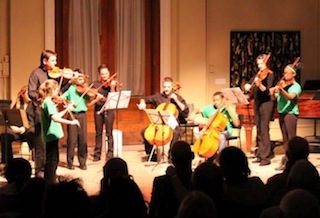
Concert:nova's "Re:member" Unforgettable

“In Flanders fields the poppies blow between the crosses, row on row . . .” (John McCrae).
World War I began 100 years ago this year.
Organizations in Cincinnati, coordinated by Cincinnati Opera, are part of a worldwide initiative, The First World War Centenary Partnership (based in London), to commemorate the war with cultural events and activities recalling the crucial conflict.
The chamber ensemble concert:nova presented their own “Re:member” Thursday night in Carnegie Center Galleries in Covington. Brainchild of Ixi Chen, managing artistic director of concert:nova, it was a program of chamber music, readings, song and dance, featuring works produced coincident with the war. The show was accompanied by historic photographs projected onto a screen. It was a searing event, marked by variety, depth and ingenuity, with everything from Irving Berlin to Maurice Ravel.
The program opened with a string quartet from MYCincinnati (Cincinnati’s early music education project in Price Hill) performing themes by Mozart and Beethoven (from the Requiem and Symphony No. 7, respectively), accompanied by a quartet of concert:nova musicians. It made for a touching beginning, compliments to MYCincinnati’s Andreina Lara and Sebastian Schemmel, violins, Kerrie Lee, viola, and Keyonte Ervin, cello.
Music by Debussy and Ravel was prominently featured on the program. Debussy was represented by his 1913 flute solo “Syrinx,” performed by Randolph Bowman, and the finale of his Trio for Flute, Viola and Harp (1915), performed by Bowman, violist Joanne Wojtowicz and harpist Gillian Benet Sella. Selections by Ravel, an ambulance driver during the war, included his Trois Chansons for mixed chorus, transcribed for voice and piano (1914-15), and featuring guest artist/soprano Amanda Carmen Bower, and excerpts from “Le Tombeau de Couperin” (1914-17), a suite written in honor of friends of Ravel who died in the "Great War."
There were also selections by Anton Webern (a soldier in the conflict), Béla Bartók, Zoltán Kodály and Igor Stravinsky.
Host was Naomi Lewin, afternoon host for radio station WQXR in New York City, formerly of WGUC-FM in Cincinnati, who lent her voice to readings and a delightful rendition of the WWI tongue-twisting ditty “Sister Susie’s Sewing Shirts for Soldiers.” Representing concert:nova were Bowman, Benet Sella, violinists Gerry Itzkoff and Mari Thomas, violists Wojtowicz and Rebe Barnes, cellist Ted Nelson and pianist Elena Kholodova.
The comprehensive program dictated economy, achieved by programming excerpts, as well as aphoristic works like Webern’s Three Little Pieces for Violoncello and Piano (barely two minutes long) and Stravinsky’s Three Pieces for String Quartet (seven minutes), both from 1914. The Webern was convincingly performed by Nelson and Kholodova. Stravinsky's Three Pieces featured a zesty first movement and a lyrical but somber conclusion in a fine reading by Itzkoff, Thomas, Barnes and Nelson.
Bartók and fellow Hungarian Zoltán Kodály were represented by the gutsy Allegro molto capriccioso from Bartók’s String Quartet No. 2 (1915-17) and Allegro serioso from Kodály’s Duo for Violin and Cello (1914). The Bartók, based on an Algerian folk song, received a vigorous performance by Itzkoff, Thomas, Barnes and Nelson, while Thomas and Nelson skillfully maneuvered the exacting turns of Kodály’s Duo.
A highlight of the program was baritone/guest artist Jonathan Cooper's sensitive reading of songs by English composer George Butterworth, a WWI hero killed in 1916 in the Battle of the Somme. Heard were "The true lover's farewell" and three of his "Six Songs from a Shropshire Lad," "Lovliest of trees," "Lads in their hundreds" and "Is my team ploughing?" All reflect the pain of loss. The final verse of "Lads in their hundreds" -- "The lads that will die in their glory and never be old" -- poignantly illustrated the human cost of WWI.
Soprano Bower brought a lighter tone to the program with Irving Berlin's 1918 song "Oh! how I hate to get up in the morning" (with its insistent quotes of reveille). In Ravel's Trois Chansons, she sang slyly of "Nicolette," a girl who puts profit before pleasure, in "Trois beaux oiseaux du paradis," of gifts brought by birds of paradise while the singer's true love has gone to war, and in the lively "Ronde" (roundelay), about woods filled with strange creatures. All were engagingly sung by Bower, with Kholodova at the piano.
One was never allowed to forget the seriousness of the program, however. There was poetry by Wilfred Wilson Gibson and a painful letter from soldier/poet Wilfred Owen of fighting and surviving a terrible battle. The letter proved a crushing testament in light of Owens' death soon afterward (1918) in battle.
Four movements from "Le Tombeau de Couperin" -- Prelude, Forlane, Menuet and Rigaudon, -- performed by Bowman, Benet Sella, Itzkoff and Barnes were accompanied by dancers from Cincinnati Ballet in choreography by James Cunningham. James Gilmer, Courtney Connor Jones, Samuel Jones and Grace Shiver demonstrated expansive motions of the hands and arms and strenuous pas de deux (not all of their moves were visible to everyone in the audience due to lack of a raised platform). It served as a fine conclusion to a remarkable program, that will long be remembered.